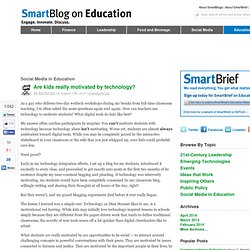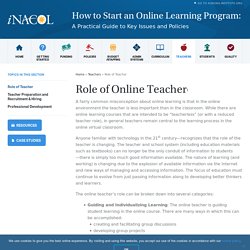

Daniel Pink on the surprising science of motivation.
How to Ignite Passion in Your Students: 8 Ways Educators Can Foster Passion-based Learning. 10 Ways to Promote Student Engagement. Student engagement is another of those buzz phrases popular in higher education.

As with many regularly used terms, everyone assumes we are talking about the same thing; but when asked for definitions, either we are hard pressed to come up one or what’s offered is a decidedly different collection of definitions. Here’s an article that includes clear definitions and, based on a creative synthesis of research, offers 10 ways to promote student engagement. The authors propose definitions broad enough to include more specific descriptions. For example: engagement is “students’ cognitive investment in, active participation in, and emotional commitment to their learning.” (p. 168) Or, engagement is “students’ involvement with activities and conditions likely to generate high-quality learning.” Based on this synthesis of research, student engagement can be promoted in the following ways: 1. 2. 3. 4. 5. 6. 7. 8. 9. 10. Reference: Zepke, N., and Leach, L. (2010). Are kids really motivated by technology?
As a guy who delivers two-day #edtech workshops during my breaks from full-time classroom teaching, I’m often asked the same questions again and again: How can teachers use technology to motivate students?

What digital tools do kids like best? My answer often catches participants by surprise: You can’t motivate students with technology because technology alone isn’t motivating. Worse yet, students are almost always ambivalent toward digital tools. While you may be completely jazzed by the interactive whiteboard in your classroom or the wiki that you just whipped up, your kids could probably care less. Need proof? Early in my technology integration efforts, I set up a blog for my students, introduced it excitedly to every class, and proceeded to get exactly zero posts in the first two months of its existence despite my near-constant begging and pleading. Five Factors that Affect Online Student Motivation. Understanding what motivates online learners is important because motivated students are more likely to engage in activities that help them learn and achieve, says Brett Jones, associate professor of educational psychology at Virginia Tech.

Based on an extensive review of the literature on student motivation, Jones has developed the MUSIC model of student motivation, which identifies five main factors that contribute to student motivation: eMpowerment, Usefulness, Success, Interest, and Caring. “The primary purpose of the model is to provide instructors with a guide that they can use to make intentional decisions about the design of their courses,” Jones says. In an interview with Online Classroom, Jones explained his model and its implications for online course design. We’re providing an excerpt of it here. 1. eMpowerment – Students feel empowered when they feel that they have some control over some aspects of their learning. iNACOL » Role of Teacher. A fairly common misconception about online learning is that in the online environment the teacher is less important than in the classroom.

While there are online learning courses that are intended to be “teacherless” (or with a reduced teacher role), in general teachers remain central to the learning process in the online virtual classroom. Anyone familiar with technology in the 21st century—recognizes that the role of the teacher is changing. The teacher and school system (including education materials such as textbooks) can no longer be the only conduit of information to students—there is simply too much good information available. The nature of learning (and working) is changing due to the explosion of available information via the Internet and new ways of managing and accessing information. The focus of education must continue to evolve from just passing information along to developing better thinkers and learners.
The online teacher’s role can be broken down into several categories: